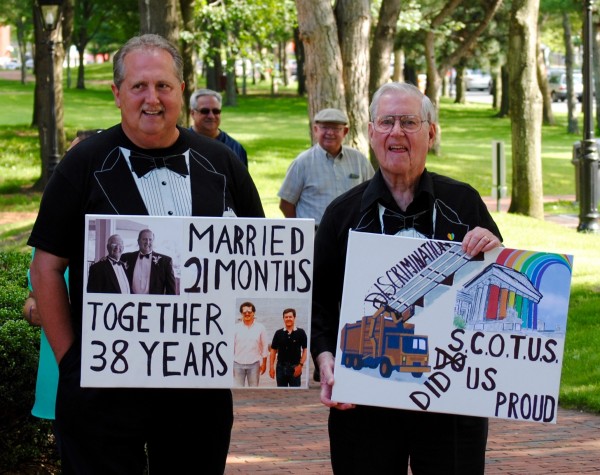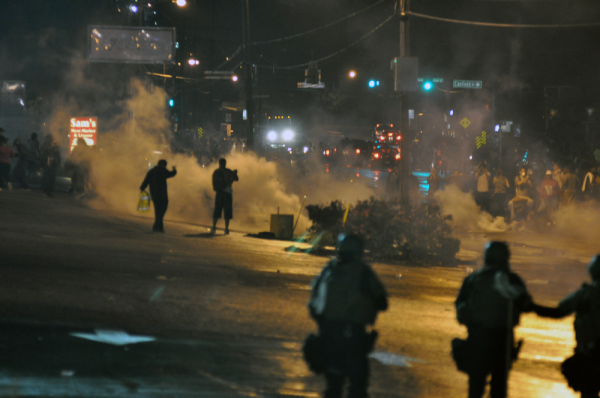 Marriage equality has been the law in Rhode Island for two years now, and its gone nationwide due to the recent SCOTUS decision, but in the General Assembly, some legislators are continuing to vote against same-sex couples seeking to get married.
Marriage equality has been the law in Rhode Island for two years now, and its gone nationwide due to the recent SCOTUS decision, but in the General Assembly, some legislators are continuing to vote against same-sex couples seeking to get married.
When the General Assembly abruptly ended its legislative season this year, it did so having passed 117 “Solemnization of Marriage” bills. These bills are perfunctory legislative favors done by Representatives and Senators for their constituents. Essentially, if a couple wishes to be married, but the officiant of their dreams is not permitted to marry the couple by law, a “Solemnization of Marriage” bill allows a one time exception.
With this bill passed, a beloved relative or family friend will now be able to conduct the wedding ceremony. Because these bills are so common, they are usually bundled together as part of a “consent calendar” which is passed with little discussion and no fanfare.
Many who voted against same-sex marriage two years ago continue that battle today and some new legislators have joined the fight by voting against solemnization of marriage bills for same-sex couples. This means that anyone seeking these perfunctory legislative favors are now putting themselves in a position to have their marriage judged by religious conservatives. These votes served to remind 25 couples that their marriage is not worthy of the same level of respect as others.
Out of the 117 solemnization bills passed last year, six were for couples with names that are traditionally associated with the same sex. Misty and Dawn, Elizabeth and Nancy, Alicia and Laura, William and Michael, Kristin and Rebecca, and Emilie and Michelle all sought and received solemnization of marriage bills. Two other couples, Sarah and Chris and Rebeccah and Alex may or not be same-sex couples, judging from the names. Of course, perusing the names like this is by no means a perfect system, so I apologize if I have missed or mischaracterized anyone based solely on a heteronormative reading of their name.
Consistently voting against same-sex marriages are Representatives Samuel Azzinaro, Arthur Corvese and Robert Phillips. Reps Justin Price, Joseph Trillo, Robert Lancia and Sherry Roberts frequently vote against same-sex solemnization bills.
Because solemnization bills are frequently bundled and passed together on a consent calendar, oftentimes these legislators find themselves voting against opposite sex marriages that happen to be part of a bundle that contains just one same-sex marriage. On May 19 Azzinaro, Corvese, Lancia, Phillips, Price, Roberts and Trillo voted against 5 marriages in total because William wanted to marry Michael. And On May 12 Azzinaro, Corvese, Phillips, Price and Trillo voted against 6 marriages because Alicia wanted to marry Rose.
I spoke by phone with Rep. Azzinaro, a Democrat serving District 37 in Westerly, about his no votes, which he says are based on his religious beliefs. Azzinaro introduced 7 solemnization bills last season, all of which passed without a single no vote.
“It’s not in my belief,” said Azzinaro about same sex marriage, “I didn’t vote for it when it was brought to the House for a vote and I don’t feel I can vote for any of these same-sex marriages.”
I asked how legislators determine which bills are for same-sex marriages and which are for opposite sex marriages. “We usually try to find out also from the sponsor of the bill if it’s a male and a female or a same-sex couple marriage, if we’re not sure,” Azzinaro said.
He went on to say that if a same sex couple in his district came to him and asked him to submit a solemnization of marriage bill before the House, he would tell them no. I asked him how he thinks his constituents would feel about that, given that he discriminates against his same-sex constituents in what kind of services he offers, based on their sexual orientation.
“They have to know who I am, how I feel,” he said.
The first video is of a passage of a Solemnization of Marriage bill, with Azzinaro, Corvese, Lancia, Phillips, Price and Roberts voting against. The second video is of the passage of a consent calendar containing one same-sex marriage and four opposite sex marriages. Azzinaro, Corvese and Phillips voted against.




